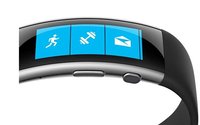 If the price is
right, consumers may swarm toward buying a wearable device.
If the price is
right, consumers may swarm toward buying a wearable device.
While many consumers already own wearables like fitness trackers and smartwatches, the main barrier to others joining in is the
cost.
Of those who don’t yet own a wearable and are unlikely to get one, price is the main stumbling block, according to the Connected in a Wearable World study by PWC.
It’s
not just one type of wearable that consumers own, but rather a pretty wide range. Here’s the breakdown:
- 45% -- Fitness band
- 27% -- Smartwatch
- 15% -- Smart
glasses (including VR/AR glasses)
- 14% -- Smart video/photo device
- 12% -- Smart clothing
Those people around the world also find plenty of reasons to own a wearable.
Here are the motivators, according to the PWC study:
- 54% -- Features that reward frequent users with monetary rewards
- 45% -- Has gaming features to compete with others
- 45% -- Provides information that would otherwise not have
- 44% -- Allows to cut back on spending
- 43% -- Has apps or features that reward with loyalty points
- 36% --
Looks good
On the other side, those without wearable devices also find plenty of reasons not to get one. In every category of fitness band, smart glasses, smartwatches and smart
clothing, the number one obstacle is price.
The second most common hesitation is the fear that the device would not be used, which would likely make price an even larger concern, with the idea
of spending a lot of money for something that won’t be used being not such a wise investment.
On the upside, those more in the market for a future purchase also see plenty of potential
reasons to take the plunge. Here’s what would drive them:
- 36% -- It’s affordable
- 30% -- It helps me be more productive
- 25% -- It tracks personal
information that is important
- 16% -- It works seamlessly with other mobile devices
- 14% -- It looks fashionable
- 14% -- It helps to be more productive at work
It appears that wearables could grow substantially more, beyond the estimated 20% of consumers who have them now.
As long as the price is right.
Like many other aspects of the
Internet of Things, it still comes down to perceived value.
---------------------------------------------------------------
The world of wearables will be discussed in detail tomorrow
at the coming MediaPost IoT Marketing Forum in New York. Check out the agenda
here.